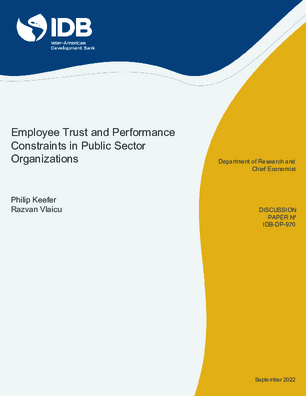Employee Trust and Performance Constraints in Public Sector Organizations (Discussion Paper)
Date
Sep 2022
Theory suggests that employee trust is key to productivity in organizations, but empirical evidence documenting links between trust and constraints on performance is scarce. This paper analyzes self-collected data on public sector employees from eighteen Latin American countries and finds that individual-level trust is relevant to three types of performance factors. First, high-trust employees are more willing to collaborate and share information with coworkers and are more supportive of technological innovation. Second, high-trust respondents have different perceptions of organizational constraints: they are less concerned with low staff quality or lack of discretion to innovate, and more concerned with staff shortages. Third, trust in coworkers is associated with stronger mission motivation. Instrumental variable strategies based on the transmission of trust through social and professional channels account for potential sources of endogeneity. A survey experiment on preferences for social distancing policies provides further evidence that trust enhances mission motivation: employee policy preferences align better with the implied government policy when their trust in the public sector is higher.




